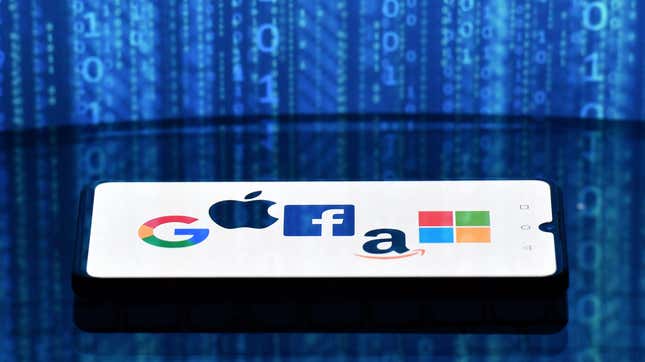
The trade organization once central to Big Tech’s intensive lobbying efforts appears to be slowly fading into the background as companies increasingly opt for a go-it-alone approach. That decline escalated this week with a new report from Axios revealing Microsoft and Uber, among two of the group’s largest members, are jumping ship.
Founded in 2012, the IA at one point included Apple, Microsoft, Google, Amazon, and Facebook (now Meta), and has served as the main vessel for pushing through favorable legislative outcomes for the companies. The IA has played a pivotal role in numerous policy decisions in recent years, including a deal to create a version of the controversial 2018 FOSTA-SESTA law that was arguably more favorable to tech companies. The group’s influence has waned since then though, especially as tech firms fret over looming antitrust legislation, an area the IA has so far opted to stay away from.
In an email, IA’s SVP of Global Communications and Public Affairs Christina Martin told Gizmodo the organization still has nearly 40 members and has every hope Microsoft and Uber may rejoin in the future. “It is always unfortunate to lose a member, but business decisions related to time and resources are to be respected,” Martin said. “Microsoft and Uber have been great supporters of IA for nearly a decade.” Microsoft meanwhile told Gizmodo in an email that the company periodically reviews its trade association memberships to “ensure alignment with our policy agenda.”
Microsoft and Uber’s departures may mark the first major companies to leave the IA, but the group has been in decline for some time now. According to a July Politico report, the IA had lost nearly one-fifth of its personnel in just over a month. Though other heavy hitters like Google, Amazon, and Mark Zuckerberg’s Meta have so far stuck with the IA, they’ve reportedly planned to significantly cut their spending to the trade organization.
Though Big Tech’s most influential lobbying firm may be on its way out sooner or later, that doesn’t mean internet giants themselves are spending any less on lobbying. Meta spent nearly $5.1 million on lobbying in the third quarter this year according to Open Secrets, the second most it’s spent of any quarter in 12 years. That’s only behind Q1 2020 (an election year). Overall, Meta alone spent 14.7 million in the first three quarters of 2021. Amazon spent the second most amongst tech firms in the third quarter, shelling out $5.04 million and $15.3 million for the year so far.
A separate report from the advocacy group Public Citizen determined Facebook and Amazon were the two biggest corporate lobbying spenders in the US last year, beating out Comcast, Lockheed Martin, Boeing, and Raytheon.
So, why are the world’s largest tech firms starting to go it alone? In many ways, they are competing against one another with similar product offerings but through significantly different business models which could mean a more fragmented lobbying approach could make sense. Though Apple and Meta, for example, will likely square off over the next decade in AR and VR applications, the two are miles apart in terms of how they monetize user data, and on their general underlying philosophy to personal privacy.
Some firms, with Meta being the most pressing example, also face far more regulatory scrutiny and public opposition, which would likely swell their lobbying check more than other less controversial companies. Tech firms are also at odds over what types of regulatory concessions they’d find palatable. Meta, Amazon, and Microsoft, for example, have all spoken in favor of new rules and standards around data privacy, but smaller firms have pushed back, claiming such rules would disproportionately benefit the top players. Conflicts like these may make tech firms simply too at odds to comfortably reside under one unified lobbying roof.
“When the Internet Association was started, you could see there was common ground, issues of principle and issues of policy that these companies all came down on the same side,” University of Washington professor Margaret O’Mara told Politico earlier this year. “Now, it’s quite different.”
And it’s not as if these mega-companies lack the financial resources needed to take lobbying into their own hands. With at least three tech firms already valued at over $2 trillion dollars, these giants can afford to go it alone and tailor their lobbying spending to suit their own individual needs.
In other words, don’t worry: Big Tech’s monetary assault on laws and governance isn’t going away anytime soon.